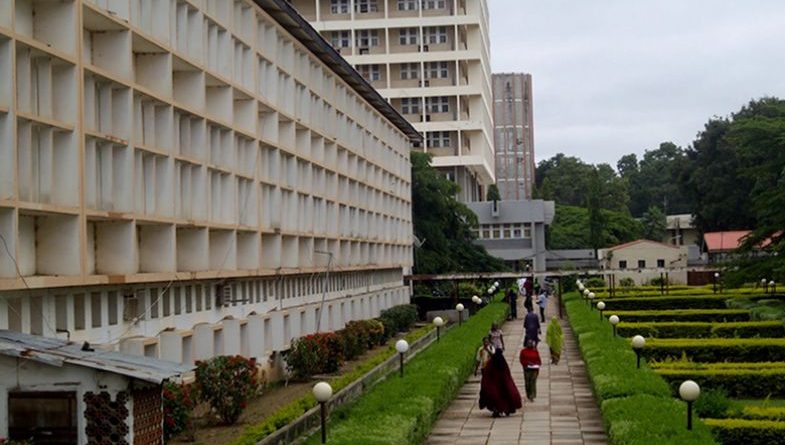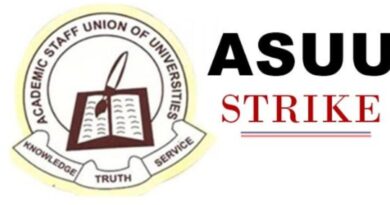Nigerian Universities In Dilemma Over Overlapping Academic Sessions
As Nigerian universities get set to resume academic activities across the country, authorities of the citadels of learning are at a crossroads over ways of managing the academic calendar to avoid overcrowding.
Academic activities in Nigerian universities were suspended between March and December 2020 due to the industrial action embarked on by the Academic Staff Union of Universities (ASUU) and the outbreak of the COVID-19 pandemic at a time most Universities were at various stages of learning.
The strike which started after government’s directive to shut down all learning institutions in Nigeria following the outbreak of the pandemic hampered completion of the 2018-2019 academic sessions in many universities, with newly admitted students in the pipeline.
READ ALSO: Underfunding and its long term effects on Nigerian Universities
However, the National Universities Commission (NUC) yesterday directed all Nigerian universities to re-open for academic activities on January 18, 2021.
The commission charged institutions to adhere strictly to safety measures put in place to curtail the spread of the virus, warning universities not to, under any circumstance, violate the full circle of semester system consistent with the benchmark minimum academic standards (BMAS) approved by the Commission as well as other extant quality standards and guidelines.
But in view of the fact that the academic calendar of universities in the country has been ruptured due to incessant strikes by lecturers, non-academic staff and students in their quest for improved conditions of service and better learning environment as well as the outbreak of coronavirus, there are great concerns over how to manage the calendar so as to avoid overcrowding across universities.
More so, since the Joint Admissions and Matriculation Board (JAMB) had managed to conduct matriculation examinations for candidates seeking admission into tertiary institutions, there are now returning 100L students (2019/20 intake, whose progressions were disrupted last year and the freshly qualified candidates ready for 2020/21 admission.
Although some universities are working out modalities to accommodate new students, many who spoke exclusively with LEADERSHIP Weekend they are in a quandary about how best to manage overcrowding when the schools eventually resume.
Meanwhile, all efforts to get reaction from JAMB on reports that it has again opened a portal for the 2020/2021 admissions proved abortive as several calls and messages put through by our correspondent were not taken.
Taraba State University expressed worry over overcrowding when the school resumes.
Director of Information and ASUU Spokesman of the University, Dr Sanisu Mohammed Sa’ad, said before the resumption date was announced, the institution had made necessary decisions on COVID-19 protocols.
He noted that plans to fumigate the school environment are on, including provision of personal hygiene, wearing of face masks, washing of hands and applying of sanitizer before attending lectures.
Dr Sa’ad further stated that due to COVID-19 and the strike action which prevented the school from completing the 2019/2020 academic sessions, the institution had decided to adjust its calendar so as to accommodate four semesters in 2021.
He foreclosed the possibility of merging the 2020/2021 JAMB candidates with the 2019/2020 batch, saying there is still time to catch up.
According to him, it is injustice to merge the two batches when the 2019 batch had already been given admission and they will complete their session before the next batch comes in.
The Taraba State Government has proposed January 18 for the resumption of both tertiary and secondary schools.
Also, the management of Abubakar Tafawabalewa University Bauchi (ATBU) has expressed its determination to harness its ICT human and material resources and blended learning system to address admission overcrowding in the university.
Speaking with our correspondent, the deputy vice-chancellor, Academics, of the University, Professor Ibrahim Muhammad, said the university has put in place measures to create a teaching and research stimulating environment via its abundant ICT and infrastructural resources in both its Gubi and Yelwa campuses.
Ibrahim said already, students admitted for the 2019-2020 academic session have undergone all the necessary screening processes before the coronavirus enforced lockdown came.
The deputy vice-chancellor noted that the university is considering the possibility of merging the 2019-2020 session with the 2020-2021 session as it was done in the 90s.
He said, “COVID-19 is a global phenomenon and government sometimes in March last year directed that all institutions be closed and here in ATBU at that time we were preparing for the commencement of the first semester 2019-2020 academic session, though before the directive there was the commencement of ASUU strike.
“At that time, we had admitted students for the 2019-2020 academic session and have started the online screening than the COVID came and here we are today with a new set of students that are supposed to come for the 2020-2021 session”.
He said ATBU has, in preparation to resume academic activities, directed its ICT directorate to work out modalities for virtual teaching and learning before students return.
He added that the ICT of the university has a robust plan to connect the students’ hostels with a strong wireless internet network to facilitate teaching and learning.
Professor Ibrahim continued: “We are leveraging our capacity in terms of human resources and ICT to maintain the quality in terms of research and teaching for which ATBU is known for.
“We are consolidating on a blended learning system where we are going to introduce ICT plus the face to face and we are going to empower all the staff of the university with at least a laptop. On the part of the students, we know that most of the students have their personal laptop but there are those like the indigene students who don’t have these laptops. So we have engaged the ICT and Library of the university to put hands together to come up with a strategy to enable us to give this kind of students computer loan”.
He said there are also strategies on ground to organise the students into small learning groups in response to COVID-19 safety protocols.
On their part, university lecturers expressed readiness to return to their classes after the strike and COVID-19 closure.
Chairman Academic Staff Union of University, Bauchi State University, Gadau, Dr Yusuf Musa Yahaya, said they are anxiously eager to resume teaching.
He said, “We have suspended our strike and we are committed to working and we are ready to do the needful to facilitate the students to finish the session and start a new session and the struggle continues.”
Also, the deputy Registrar Information and Publication, University of Jos, Abdulahi Babangida Abdulahi, when contacted, said the Senate, which is the highest decision making body of the University, will meet next week to decide on what to do concerning the development.
On its part, the University of Port Harcourt said its plan for the 2020/2021 academic calendar will accommodate old students whose academic activities were affected by the COVID-19 pandemic as well as those that wrote the Joint Admission and Matriculation Board (JAMB) entrance examination in 2020.
Speaking with LEADERSHIP Weekend in Port Harcourt, spokesman of the University, Sammy Kpenu, said while the old students will resume academic activities on Monday, February 1, 2021, those who wrote JAMB entrance examination will start their pre resumption registration exercise on April 12, 2021.
Kpenu said, “The Senate of the University of Port Harcourt actually met today to take a look at the revised academic calendar for the 2019/2020 session for full time programmes of the University.
“With this development, we want to inform the public that all returning students of the university are expected back on Friday, 29th to Sunday, 31th January 2021. With these developments, lectures will begin on February 1, 2021. I want you to know that before the Covid-19 pandemic that resulted in the closure of schools, the University of Port Harcourt had already done nine weeks of studies and it was actually supposed to be 13 weeks.
“So, the first semester will be held from Monday, February 1, to Friday, February 26, 2021. The second semester will kick off from April through September 2021. Concerning the 2020/2021 academic session, that is those new set of people who are coming in, we are going to run two streams. Those who wrote JAMB in 2020 will start from April 12, 2021 while those who were already in Year One will start on February 1, 2021,” he added.
On its part, the Imo State University (IMSU) said that it has worked out modalities to address the challenges encountered as a result of the ASUU strike and COVID 19 Pandemic.
The Public Relations Officer of the University, Okenze Ralph Njoku Obi said when school resumes, they intend to segment the programmes and classes so as to sooth the needs and aspirations of the students and Lecturers.
He stated that having found out that the ASUU strike coupled with COVID-19 lockdown affected both the 2019 and 2020 Academic calendar of the school, they have no option than to readjust their calendar.
Obi explained that the governing council of the institution had been fashioning out modalities and thinking out of the box so as to create an enabling environment where students would be undertaking their studies systematically and adhering strictly with COVID 19 protocols.
The PRO noted that the school is optimistic that the formula the school would adopt will work out successfully and be beneficial to all concerned.
In line with the NUC directive on reopening of Federal Universities, the committee Of Deans and Directors (CDD) of Federal University Of Agricuture, Màkurdi (FUAM), has approved the reopening of the university for academic activities with effect from 18th January 2021,
A Statement by the Registrar of FUAM Mrs Helen Nyitse disclosed that students are expected on campus on Friday January 22, 2021 just as the CDD also approved a revised academic calendar for use on resumption.
“The calendar for second semester 2018/2019 examination will hold from Monday 25th January 2021 to Friday 5th February 2021, while the 2019/2020 academic session will commence on Monday 8th February 2021 with student registration/ orientation which will last for two weeks,” she said.
She urged Students and caregivers to get more details of the revised academic calendar at the university’s website www.uam.edu.ng.
The registrar also advised all FUAM returning students to strictly adhere to all COVID -19 prevention protocols while on campus.
Meanwhile the vice chancellor of FUAM professor Richard Kimbir has assured that the university will do everything necessary, including online teaching, to ensure the successful implementation of the revised academic calendars.
To this end, the VC also announced that there will be a trainers training for online teaching for lectures as soon as the university reopens.
Uncertainty Over Resumption As ASUU Accuses FG Of Reneging
Meanwhile, there are fears over the readiness of the Academic Staff Union of Universities (ASUU) to resume on January 18 as some members of the union are alleging that the federal government was only able to address six out of the nine conditions given, leaving behind three of the agreements which are very crucial.
ASUU said it is still tracking the implementation of the December 2020 Memorandum of Action by the government.
The national president of ASUU, Professor Biodun Ogunyemi, said this yesterday, in an interview with LEADERSHIP Weekend.
Reacting to the plan ahead of resumption and whether the Union has been paid all their money being owed by the government, he said ASUU has not taken any decision to continue strike over non-payment of salaries in any branch.
He said, “Government agents have told us about some challenges. The union shall soon meet to undertake a comprehensive review of the situation in all our campuses. We hope they won’t allow things to get out of hands before apprehending the situation.”
Also, ASUU chairman, Usmanu Dandodiyo University, Sokoto (UDUS), Dr Abubakar Sabo, said rather than paying them their eight months arrears as agreed, the federal government only paid two months and pathetically refused to pay a single month to faculty of Veterinary and Human medicines.
Sabo who added that some universities are still contemplating on how best to address the issue noted that some institutions were yet to commence before the industrial strike commenced after giving out admissions.
He stressed that the decision on how best to handle the situation depends on the university’s capacity.
Sabo added that some might consider cancellation, merging or running parallel sessions.
“The truth of the matter is that some Universities may be taking decisions of what they can handle”, he noted.
Speaking in support of the UDUS-ASUU Chairman, a non-academic Staff of the university who preferred anonymity said they are waiting for whatever the Senates of the universities will come up with from their expected meetings on the issues.
Meanwhile, some experts have also expressed concern about the best ways to accommodate both the old and new students alike.
A lecturer at the Department of Chemical Engineering, Ahmadu Bello University Zaria, Dr Usman Abubakar, said there should be no admission for new applicants until the current 100 level students are cleared.
He said, “This option may mean wasting one year in the lives of thousands of qualified candidates. To say the least, this is far from being good for the students, parents/guardians and overall national development. Unified Tertiary Matriculation Examination (UTME) results expire after one year, so in the course of the waiting, thousands of applicants would have drifted outside the validity period of their UTME results.
“However, in this competitive space, universities are expected to figure out innovative means of addressing the challenge. So, there is a reputational issue here and universities do not take that lightly. This option also comes with potential revenue loss to concerned universities. Note that with UTME results expiration after a year, the prospect for having more than two applicants’ streams waiting for admission is practically not possible unless JAMB is going to relax its results management guidelines.”
Abubakar also suggested running two parallel streams of students. “Expectedly, the 2019/20 batch will be some weeks ahead of the 2020/21 batch. This disharmony can be eliminated at some point, the shorter the gap between the two streams, the sooner the harmonization takes place. This option will ‘favour’ the students but teaching/learning resources may have to be overstretched and/or new ones be injected into the system in order to cater for the two batches”, he stated.
He also suggested merging the two streams as another good alternative, saying that the option is feasible only where the institution closed after covering a very few weeks in the first semester.
He noted: “The new batch may be ushered in first and fast tracked to be at par with the older (2019/2020) batch before the merger. But the salient questions are: are there big enough classes, accommodations, staffing, and lecture halls to handle the merged streams? The answer to this question is no for nearly all the universities. Also, in the face of COVID-19 economic realities, including the need for social distancing, can the student fees plus grants cover the extra costs?
“Is it realistic to shift the extra cost to parents/students? Even if the money is available, can the universities mobilise such resources to deploy the extra facilities, such as halls and hostels, within the next few weeks? We are already in January, 2021”.
He further said the ICT supported blended education (ISBE), which is a hybrid option involving both online and face to face classes (blended) and Information and Communications Technology (ICT) supported teaching/learning, would be imperative.
He added: “This appears to be the most viable answer to the question raised at the beginning. Options two and three are combined here, which involves merged classes after calendar harmonization, some parallel classes and careful deployment of ICT tools along with online-ready course materials.
“So first, courses and/or curricula elements that can effectively be delivered via online means must be quickly identified and rendered into mixed media formats”.
Credit to leadership.ng
For Advert Placement, Sponsorship, support, Article submission, suggestion, etc, Contact us: info@theabusites.com, +2349015751816 (WhatsApp)








